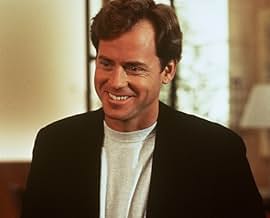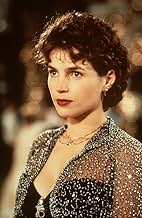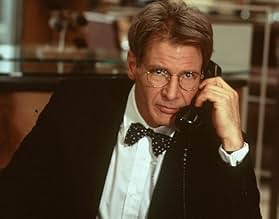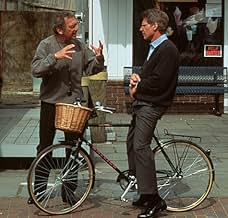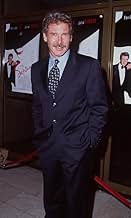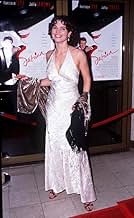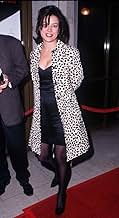Sabrina
- 1995
- Tous publics
- 2h 7min
NOTE IMDb
6,3/10
46 k
MA NOTE
Linus a su faire fructifier la fortune qu'il a héritée de son père. Grâce à lui, la famille Larrabee est l'une des plus riches du pays. David, son frère, mène une vie de séducteur oisif et S... Tout lireLinus a su faire fructifier la fortune qu'il a héritée de son père. Grâce à lui, la famille Larrabee est l'une des plus riches du pays. David, son frère, mène une vie de séducteur oisif et Sabrina se consume d'amour pour lui.Linus a su faire fructifier la fortune qu'il a héritée de son père. Grâce à lui, la famille Larrabee est l'une des plus riches du pays. David, son frère, mène une vie de séducteur oisif et Sabrina se consume d'amour pour lui.
- Réalisation
- Scénario
- Casting principal
- Nommé pour 2 Oscars
- 2 victoires et 6 nominations au total
Avis à la une
Although terribly predictable and a bit too long, this film is kind of sweet. Ford shines as in his typical role of comically aloof and Ormand plays her lead well. Good chemistry and cinematography.
I was surprised at how good this movie is. A remake of a movie starring Audrey Hepburn, Humphrey Bogart and William Holden, directed by one of the greats of American cinema, Billy Wilder, is not exactly the kind of task for the faint of heart. The fact that Sydney Pollack (They Shoot Horses Don't They? (1969), Tootsie (1982), Out of Africa (1985), etc.) decided to do it must have raised a few eyebrows in Hollywood land.
And let's just say I had preconceptions as I sat down to watch this. No way could this be anything near as good as the original. And for the first twenty minutes or so I was not dissuaded. Julia Ormond, who was given Miss Hepburn's title role, seemed nothing far removed from ordinary; and Greg Kinnear, who played the playboy David Larrabee, seemed a poor imitation of William Holden. Of course Harrison Ford, I told myself, is another story, since he is the embodiment of the fulfillment of the desire of many woman, and a fine, accomplished leading man. He would be, I suspected, the lone bright spot. In the original, Humphrey Bogart, a little past his prime, and in not exactly the best of moods, and not entirely pleased with the relatively inexperienced Audrey Hepburn, played the cool tycoon Linus Larrabee with some distracted forbearance in what many consider one of his lesser performances. Surely Harrison Ford could improve on that.
He did, but what really surprised me was just how diabolically clever the oh, so romantic script by Barbara Benedek and David Rayfiel turned out to be. I mean, Cinderella move over. Sabrina could not have achieved a more glorious existence had she died and gone to heaven. It is hard to imagine a more fulfilling fantasy for a chauffeur's daughter than what transpires here.
Quickly here's the premise of this celluloid fairy tale/romance: Pretty but ordinary Sabrina, born of working class parents, her father the chauffeur of the ultra rich Larrabees, grows up living above the garage in the palatial Larrabee estate. She watches the lavish parties thrown by the Larrabees from a spot in a tree and falls madly in the kind of puppy love that never goes away with the younger of the Larrabee brothers, David, who is the kind of guy who gives playboys a bad name. When she comes of age, she goes away to Paris (apparently to work for a fashion magazine: in the original Sabrina, she goes to a cooking school in Paris), picks up confidence and a new kind of eye-popping sophistication, comes back and...well, gets noticed.
The basic skeleton of this, the story from the first Sabrina (1954), which is dreamily romantic enough and then some, is greatly augmented here with some very fine psychological touches including developing Sabrina's character beyond the pretty and stylish to something bordering on the wise and heroic. Suffice it to say that we come away feeling she deserves every rainbow's end she gets. I can see Benedek and Rayfiel exclaiming with riotous joy as they are writing the script (trading e-mails perhaps): "They want romance, they want woman's fantasy? They want Sabrina to have a pot of gold and true love everlasting? How about riches beyond counting and the doting attention of the two handsome, very rich brothers? She can take her pick. We've give 'em romance, we'll give 'em dreams come true!" And they do. Not only that, but they keep us guessing about who gets the girl until the last possible moment, and they do that very cleverly.
Of course it helps to have professional direction by Sydney Pollack and a fine cast including Harrison Ford--at his best, by the way--and Julia Ormond, a hard-working and talented actress (I recall her from Smilla's Sense of Snow, 1997), who knows how to be cute without fawning, supported by Greg Kinnear, Nancy Marchand, John Wood and Angie Dickinson. I mention Miss Dickinson because, as the mother of a perspective bride about to throw an incredibly lavish wedding, she gets to deliver this "let them eat cake" line: "We thought we'd use recycled paper" (for the wedding invitations).
The script is full of similar witticisms, some verbal, some like eye candy. For example, when Sabrina removes her glasses (the usual Hollywood signal for the adolescent ugly duckling to become a beautiful swan) after gaining sophistication in Paris, she quotes aptly but surprisingly from Gertrude Stein: "America is my country and Paris is my home." (Of course Gertrude Stein never heard of Paris, Texas--but that is another film, and besides, I digress...)
I also liked it when Sabrina is in the arms of her Paris would-be lover who kisses her, and--noticing that she is not as engaged as she might me–observes with perfect decorum, "I'm embarrassed that you're somewhere else."
Memorable was the shot of Harrison Ford momentarily looking jealous and hurt. By the way, he has a number of good lines, and he delivers them well.
I especially liked it when he sadly confessed: "I was sent to deal with you. I sent myself."
It is probably better if you haven't seen the original and can experience this on its own merits without the odiousness that sometimes comes with comparisons. Comparing Audrey Hepburn with Julia Ormond is like comparing Grace Kelly with Jennifer Lopez. They really are very different people. And comparing Billy Wilder's 1954 film (from the play by Samuel Taylor) is a little like comparing Lon Chaney's Phantom of the Opera with Andrew Lloyd Webber's.
Bottom line: see this for both Harrison Ford who wears the business-first character of the "only surviving heart donor" very well, and for Julia Ormond whose intense and beguiling performance makes us forgive her for not being Audrey Hepburn.
(Note: Over 500 of my movie reviews are now available in my book "Cut to the Chaise Lounge or I Can't Believe I Swallowed the Remote!" Get it at Amazon!)
And let's just say I had preconceptions as I sat down to watch this. No way could this be anything near as good as the original. And for the first twenty minutes or so I was not dissuaded. Julia Ormond, who was given Miss Hepburn's title role, seemed nothing far removed from ordinary; and Greg Kinnear, who played the playboy David Larrabee, seemed a poor imitation of William Holden. Of course Harrison Ford, I told myself, is another story, since he is the embodiment of the fulfillment of the desire of many woman, and a fine, accomplished leading man. He would be, I suspected, the lone bright spot. In the original, Humphrey Bogart, a little past his prime, and in not exactly the best of moods, and not entirely pleased with the relatively inexperienced Audrey Hepburn, played the cool tycoon Linus Larrabee with some distracted forbearance in what many consider one of his lesser performances. Surely Harrison Ford could improve on that.
He did, but what really surprised me was just how diabolically clever the oh, so romantic script by Barbara Benedek and David Rayfiel turned out to be. I mean, Cinderella move over. Sabrina could not have achieved a more glorious existence had she died and gone to heaven. It is hard to imagine a more fulfilling fantasy for a chauffeur's daughter than what transpires here.
Quickly here's the premise of this celluloid fairy tale/romance: Pretty but ordinary Sabrina, born of working class parents, her father the chauffeur of the ultra rich Larrabees, grows up living above the garage in the palatial Larrabee estate. She watches the lavish parties thrown by the Larrabees from a spot in a tree and falls madly in the kind of puppy love that never goes away with the younger of the Larrabee brothers, David, who is the kind of guy who gives playboys a bad name. When she comes of age, she goes away to Paris (apparently to work for a fashion magazine: in the original Sabrina, she goes to a cooking school in Paris), picks up confidence and a new kind of eye-popping sophistication, comes back and...well, gets noticed.
The basic skeleton of this, the story from the first Sabrina (1954), which is dreamily romantic enough and then some, is greatly augmented here with some very fine psychological touches including developing Sabrina's character beyond the pretty and stylish to something bordering on the wise and heroic. Suffice it to say that we come away feeling she deserves every rainbow's end she gets. I can see Benedek and Rayfiel exclaiming with riotous joy as they are writing the script (trading e-mails perhaps): "They want romance, they want woman's fantasy? They want Sabrina to have a pot of gold and true love everlasting? How about riches beyond counting and the doting attention of the two handsome, very rich brothers? She can take her pick. We've give 'em romance, we'll give 'em dreams come true!" And they do. Not only that, but they keep us guessing about who gets the girl until the last possible moment, and they do that very cleverly.
Of course it helps to have professional direction by Sydney Pollack and a fine cast including Harrison Ford--at his best, by the way--and Julia Ormond, a hard-working and talented actress (I recall her from Smilla's Sense of Snow, 1997), who knows how to be cute without fawning, supported by Greg Kinnear, Nancy Marchand, John Wood and Angie Dickinson. I mention Miss Dickinson because, as the mother of a perspective bride about to throw an incredibly lavish wedding, she gets to deliver this "let them eat cake" line: "We thought we'd use recycled paper" (for the wedding invitations).
The script is full of similar witticisms, some verbal, some like eye candy. For example, when Sabrina removes her glasses (the usual Hollywood signal for the adolescent ugly duckling to become a beautiful swan) after gaining sophistication in Paris, she quotes aptly but surprisingly from Gertrude Stein: "America is my country and Paris is my home." (Of course Gertrude Stein never heard of Paris, Texas--but that is another film, and besides, I digress...)
I also liked it when Sabrina is in the arms of her Paris would-be lover who kisses her, and--noticing that she is not as engaged as she might me–observes with perfect decorum, "I'm embarrassed that you're somewhere else."
Memorable was the shot of Harrison Ford momentarily looking jealous and hurt. By the way, he has a number of good lines, and he delivers them well.
I especially liked it when he sadly confessed: "I was sent to deal with you. I sent myself."
It is probably better if you haven't seen the original and can experience this on its own merits without the odiousness that sometimes comes with comparisons. Comparing Audrey Hepburn with Julia Ormond is like comparing Grace Kelly with Jennifer Lopez. They really are very different people. And comparing Billy Wilder's 1954 film (from the play by Samuel Taylor) is a little like comparing Lon Chaney's Phantom of the Opera with Andrew Lloyd Webber's.
Bottom line: see this for both Harrison Ford who wears the business-first character of the "only surviving heart donor" very well, and for Julia Ormond whose intense and beguiling performance makes us forgive her for not being Audrey Hepburn.
(Note: Over 500 of my movie reviews are now available in my book "Cut to the Chaise Lounge or I Can't Believe I Swallowed the Remote!" Get it at Amazon!)
Many critiques on this site suppose that it is somehow superior to the original. I am not sure how this can hold up. While Harrison Ford and Greg Kinnear are fine actors in their own right, comparing them to the coupling of Bogart and Holden is ridiculous. Just because a movie is OLD does not make it better, but if it is impeccably filmed and acted superbly, what is the point in redoing it to inferior standards? I suggest that the state of movie-making has in fact declined, as the art form has given way to popular sentiment, over-the-top portrayals of characters, and remakes which attempt to market themselves on previous successful attempts. To say that someone who repainted a Michaelangelo has made it somewhat made it better because painting has "evolved" is equally as stupid as saying any remake improves. And while Audrey Hepburn is not the world's finest actress, she has a unique cinematic quality which cannot be imitated or reproduced, much like her co-stars in this film. Please Hollywood, stop reproducing classics simply because there is a drought of originality and screenplays. Try rereleasing these classics so the public can see movies as they were meant to be viewed.
The temptation to compare it with the 1954 version is not small. And it is a good thing because the film has the force to use its voice. Julia Ormond is realy Sabrina. And Harrison Ford is a revelation as Linus. But, for me, the authetic good points are Miriam Colon as lovely Rosa and Nancy Marchand as wise,fascinating Maude Larrabee. Short, a seductive film.
Passable but overlong remake of the classic Audrey Hepburn vehicle will play best for those not familiar with the original. The cast(Harrison Ford, Julia Ormond, Greg Kinnear) performs well and its production values are high but director Sydney Pollack's pacing tends to flag. By contrast, Billy Wilder's direction of the 1954 version is much tighter and quicker. Interestingly this "Sabrina" is 15 minutes longer than its predecessor but thanks to Pollack those extra 15 minutes feel like 30. Also, Barbara Benedek's and David Rayfiel's script lacks the wittiness that scenarists Billy Wilder, Samuel Taylor("Vertigo") and Ernest Lehman("The Prize," "North by Northwest") provided the first time around.
Bottom line: 6 out 10.
Bottom line: 6 out 10.
Le saviez-vous
- AnecdotesSydney Pollack initially turned down the chance to direct the remake, thinking the material too dated to work effectively in 1995. Once he agreed to take it on, Pollack made sure he had the approval of the original's director, Billy Wilder.
- GaffesLinus leaves the first party early because he needs to check on the Tokyo markets before they close. But Tokyo financial markets would close at 4:00 AM or 5:00 AM New York time. It is clearly not that late in the evening.
- ConnexionsEdited into Sting: Moonlight (1995)
- Bandes originalesMoonlight
Music by John Williams
Lyrics by Alan Bergman and Marilyn Bergman
Performed by Michael Dees
Produced by John Williams
Meilleurs choix
Connectez-vous pour évaluer et suivre la liste de favoris afin de recevoir des recommandations personnalisées
- How long is Sabrina?Alimenté par Alexa
- Is "Sabrina" based on a book?
- How closely does the remake follow the original 1954 movie?
Détails
Box-office
- Budget
- 58 000 000 $US (estimé)
- Montant brut aux États-Unis et au Canada
- 53 672 080 $US
- Week-end de sortie aux États-Unis et au Canada
- 5 563 259 $US
- 17 déc. 1995
- Montant brut mondial
- 53 696 959 $US
- Durée2 heures 7 minutes
- Couleur
- Mixage
- Rapport de forme
- 1.85 : 1
Contribuer à cette page
Suggérer une modification ou ajouter du contenu manquant



